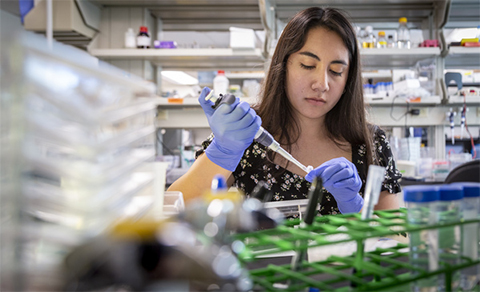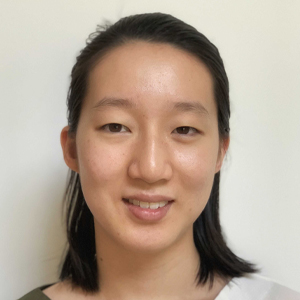‘ASBMB opened the doors for me’
A fellow student first drew Clarissa Nuñez to the American Society for Biochemistry and Molecular Biology Student Chapter at New Mexico State University. After hearing a classmate promote the ASBMB in her first year, Nuñez started showing up to meetings and never looked back. Before her graduation last year, she served as a secretary, president and vice president of the chapter.
Coming into college from her hometown of Las Cruces, New Mexico, Nuñez knew she enjoyed science and was excited to learn about how life works at the molecular level. At New Mexico State, she went through a process of elimination to find her major, ultimately deciding on biochemistry with a minor in molecular biology.

Science didn’t seem like a potential career until she joined the ASBMB Student Chapter, Nuñez said. It was there that she heard from other students working in research labs, helped host events such as career development talks and scientist panels, and found out about the National Institutes of Health Maximizing Access to Research Careers, or MARC, fellowship, which helps fund undergraduate degrees while encouraging hands-on research experience. She successfully applied to the MARC program, and it became another cornerstone of her college experience.
Through both the ASBMB chapter and MARC, Nuñez found a community of like-minded peers and new ways to explore science. Classmates became friends with whom she could study, talk about and do research, and eventually go through the graduate school application process.
MARC also gave her great female and Hispanic mentors, including the two scientists who led the program.
“It unlocked a whole new layer of the university, the science community on campus that I would not have been exposed to if I didn’t attend the meetings,” she said of the Student Chapter.
As part of the MARC fellowship, Nuñez worked on an independent project in Brad Shuster’s lab for her last two undergrad years. Her work focused on the protein PRC1 and its role in cell division, and she said this experience taught her fundamental lab skills in addition to being, in her words, a really fun project.
Another formative research opportunity was an internship at the Fred Hutchinson Cancer Research Center, where she got to work in the lab full time. With all this training under her belt, Nuñez realized she had a passion for research.
“As I had these experiences, and as they wrapped up, I think I just realized the thing I wanted to do most was work in a research lab forever,” she said, adding that she asked herself, “What’s one way I can be challenged to improve those skills and really become a rigorous scientist?”
For her, the answer was graduate school, and Nuñez now is situated happily at the University of Texas Southwestern pursuing a Ph.D. in cell and molecular biology. Looking back on her academic journey, she said her commitment to the ASBMB chapter was key. From the challenges of being president to the joys of scientific outreach, from her initial uncertainty about a graduate degree to taking that leap of faith, the community she found within the ASBMB has been a guiding force.
“I think just having that experience in undergrad really opened so many doors for me,” she said, “and honestly, I don’t think I’d be where I’m at if I had not been a member, as cheesy as that sounds. It really did open a lot of connections, and mentorship, and different things that paved the way to where I am now.”
Enjoy reading ASBMB Today?
Become a member to receive the print edition four times a year and the digital edition monthly.
Learn moreFeatured jobs
from the ASBMB career center
Get the latest from ASBMB Today
Enter your email address, and we’ll send you a weekly email with recent articles, interviews and more.
Latest in People
People highlights or most popular articles

Building a career in nutrition across continents
Driven by past women in science, Kazi Sarjana Safain left Bangladesh and pursued a scientific career in the U.S.

Kiessling wins glycobiology award
She was honored by the Society for Glycobiology for her work on protein–glycan interactions.

2026 ASBMB election results
Meet the new Council members and Nominating Committee member.

Simcox wins SACNAS mentorship award
She was recognized for her sustained excellence in mentorship and was honored at SACNAS’ 2025 National Conference.

From humble beginnings to unlocking lysosomal secrets
Monther Abu–Remaileh will receive the ASBMB’s 2026 Walter A. Shaw Young Investigator Award in Lipid Research at the ASBMB Annual Meeting, March 7-10 in Washington, D.C.

Chemistry meets biology to thwart parasites
Margaret Phillips will receive the Alice and C. C. Wang Award in Molecular Parasitology at the ASBMB Annual Meeting, March 7-10 in Washington, D.C.

